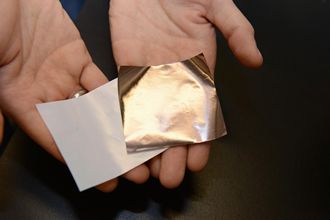 Scientists at Purdue University said that they have converted packing peanuts into high performance carbon electrodes for lithium-ion (Li-on) batteries.
Scientists at Purdue University said that they have converted packing peanuts into high performance carbon electrodes for lithium-ion (Li-on) batteries.
Packing peanuts are not peanuts but fill for boxes to protect goods being shipped. They’re made out of starch.
The researchers said the electrodes will outperform conventional graphite electrodes and is a n environmentally friendly approach.
The Purdue scientists have gone one step further because they have also made carbon nanoparticle anodes from polystyrene.
There’s a mystery here though, because a research assistant said “We were getting a lot of packing peanuts while setting up our new lab”. A professor decided to see if it was feasible to use the packing peanuts in a creative way.
Professor Vilas Pol said that while packing peanuts are used worldwide to ship goods, they’re very hard to break down, and only 10 percent are recycled. That means the majority of them end up in landfills.
Pol said that the method for using these packing peanuts as electrodes is cheap, environmentally friendly, and practical for large scale manufacturing.








